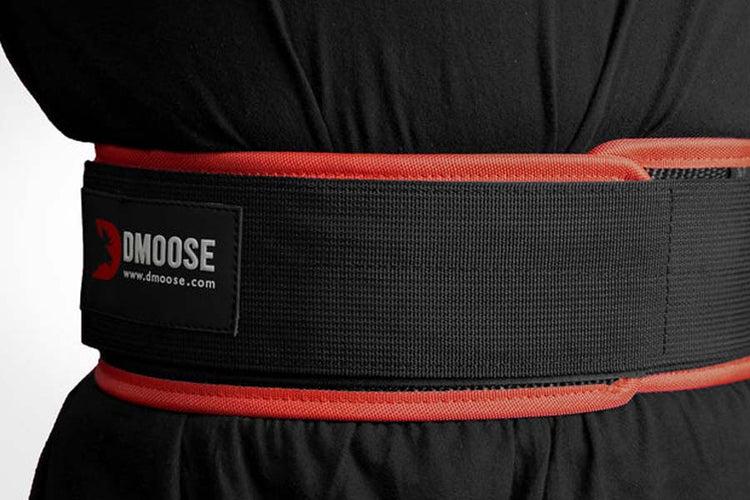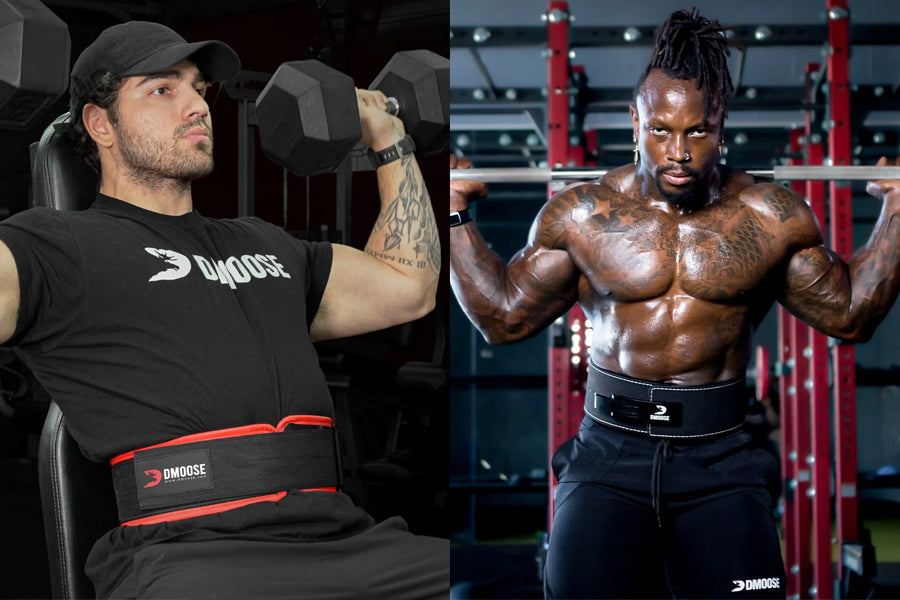Are you tired of hitting a plateau in your strength training? If you desire that extra edge to push your limits and shatter your record, Look no further. Prepare to witness the epic clash of powerlifting belts - the ultimate showdown between the relentless-lever belt's unyielding force and the nylon belt's adaptive versatility.
Think of a time when you were on the verge of something big and exciting. You find yourself in the middle of a fight between two very strong opponents. The lever belt is an amazing piece of gear that gives constant stability and support that can't be found anywhere else.
On the other hand, the nylon belt is calling out to you, assuring you of its ability to enhance your agility, provide the utmost convenience, and offer a flawless fit for all your movements. Dive into the world of powerlifting belts as we uncover the secrets behind their design, functionality, and the impact they can have on your performance.
Join us as we discover what experienced trainers, players, and powerlifting experts have learned about how to use these amazing training tools to change people's lives. We will give you the information and advice you need to make a smart choice, leading you to the belt that will take your workouts to new heights.
What is Strength Training?
Strength training is a form of physical activity that helps build muscle strength and endurance. It involves lifting weights or using body weight through exercises such as push-ups, pull-ups, squats, and lunges.
Strength training has many benefits for your overall health and well-being, including improved strength and muscle tone, bone density, balance and coordination, posture and flexibility, energy levels, and metabolism. Strengthening the muscles can also help reduce pain from arthritis or other conditions.
Regular strength training can also help reduce stress levels by releasing endorphins into the bloodstream. For those looking to increase their fitness level, strength training is an effective way to do so quickly.
With proper form and guidance from a certified fitness professional, anyone can increase their strength and endurance through this type of physical activity. It is an important part of any well-rounded fitness routine.
Related Article: 11 Best Equipment for Strength Training
Lever Belt

Lever belts are a popular choice among serious lifters. These belts are designed with a sturdy lever buckle and crafted from thick, durable material. The lever buckle ensures exceptional stability, providing a secure fit for intense workouts.
Adjusting the belt is a breeze. You can tighten or loosen it as needed quickly. While lever belts offer outstanding support. It is worth noting that they can be more expensive than other options, and proper sizing is crucial for optimal performance.
Enhance your weightlifting routine with the exceptional DMoose 10MM Lever Weightlifting Belt. This top-quality belt is meticulously crafted to provide stability and protection for all.
Experience unmatched support and adjustability with the advanced quick-release lever buckle. This belt has a sleek and robust genuine leather design, perfect for weightlifting enthusiasts. Its recyclable packaging and complimentary carry bag offer an environmentally conscious and portable solution for all your weightlifting needs.
Nylon Belt

If affordability and versatility are your priorities, nylon belts may be the way to go. These belts feature adjustable Velcro straps that allow easy customization and a snug fit. The materials used in nylon belts offer flexibility, making them suitable for various body types.
They are user-friendly, quick to put on and take off, and can be adjusted on the fly. However, it is essential to note that nylon belts may have limited stability for extremely heavy lifts, and the nylon itself may wear out over time with frequent use.
Lever Belt Vs. Nylon Belt
When maintaining good form during lifts, weightlifting belts are a must-have. Although these belts appear similar at first glance, there are two distinct types: Lever weightlifting belt and Nylon weightlifting belt. Each type has its own unique set of advantages and disadvantages. Let us dive in and take a closer look at the differences between lever belts and nylon belts.
Comfort & Fit
Comfort is key when selecting a belt for weightlifting - you don't want something digging into your waist or uncomfortable after long sets! Lever belts tend to have a more rigid construction than their nylon counterparts. As such, they may be less comfortable because they can create a lot of pressure around the waist.
On the other hand, nylon belts are generally more adjustable and have a softer construction, making them much more comfortable to wear for long sets.
Cost & Value
When it comes to price and value for money, nylon belts typically offer better value when compared to lever belts. This is because they are usually cheaper and easier to maintain, meaning you can use them for less money than their lever belt counterparts.
Lever belts may be more expensive. Still, they also offer superior durability and reliability, which makes them a worthwhile investment in the long run.
Ease of Use
Lever-style buckles are much easier to use than velcro fasteners as they only require the simple press of a button or lever to be adjusted and secured into place. Nylon, however, can be difficult to adjust due to its multiple layers, which may require more effort for proper closure.
Lever belts are also quicker and easier to take off and put on, making them ideal for those needing quick access to their belt.
Maintenance
Another factor to consider when deciding between a Lever belt or a Nylon belt is the maintenance required. The good news is that both types of belts require minimal maintenance.
However, lever belts may need to be oiled occasionally to keep them looking their best. On the other hand, nylon belts simply need to be wiped down after use to remove dirt and sweat residue.
Security
Lever-style buckles are designed to stay securely fastened once set into place, making them much less likely to come undone than nylon fasteners. This makes lever belts the ideal choice for activities that require a secure fit, such as weightlifting or horseback riding.
Nylon belts, however, can easily become loose and be difficult to keep securely in place while engaging in any type of physical activity.
Appearance
Lever belts generally have an attractive, minimalist design that gives a sophisticated look to any outfit. On the other hand, Nylon belts are more bulky and can be less aesthetically pleasing than lever belts.
Lever belts come in many colors and materials, such as leather or nylon. In contrast, nylon belts are usually only available in basic color combinations.
Weightlifting Vs. Powerlifting
When deciding between a Lever belt or a nylon belt, it is essential to consider what type of lifting you will be doing, as this may influence your decision. Generally speaking, powerlifters prefer lever belts since they are designed with heavier weightlifting in mind.
A lever belt is the preferred option for weightlifting due to its greater stability and support. Lever belts can help lifters better brace their core when lifting and maintain a neutral spine position without putting too much strain on the lower back.
A lever belt is also beneficial for deep squats as it provides additional stability and helps maintain proper form throughout the entire range of motion. However, you may find that lever belts can be too tight for comfort when doing Olympic-style weightlifting movements such as cleans or snatches.
On the other hand, nylon belts are suitable for powerlifting exercises such as bench presses or deadlifts where less range of motion is required. nylon belts don't provide as much support as lever belts. Nylon belts are also easier to remove and put on between sets.
Still, they come in handy when trying to quickly adjust the tightness of the belt during heavier lifts or when changing between sets quickly. The flexibility of a nylon belt also makes it easier to move around during the lift.
FAQs
1. Are there any downsides to using a lever belt?
The main downside of lever belts is that they tend to be bulkier than nylon belts due to their metal construction. This can make them slightly uncomfortable if you are wearing tight-fitting clothing, such as gym shorts or compression shirts.
Additionally, some people may find the sound of the metal buckle distracting while lifting. However, these minor inconveniences usually pale compared to the many benefits of using a lever belt.
2. Are there any special care instructions for a lever belt?
It is essential to regularly clean and condition your lever belt. Most manufacturers recommend wiping the leather with a damp cloth and then applying a leather conditioner or wax to keep it soft and supple.
Additionally, it's important not to leave your belt in direct sunlight or heat, as this can damage the leather over time. With proper care and maintenance, most lever belts will last for years!
3. What is the difference between a 4-inch and 6-inch Lever Belt?
The main difference between a 4-inch and 6-inch lever belt is in the width of the belt itself. A 4-inch belt will provide more support around your midsection, while a 6-inch belt will be better for heavier lifts like squats or deadlifts.
The width of your belt should be determined by the type of lifts you plan on doing and the level of support you need.
4. Are there any special care instructions for Nylon Belts?
It is essential to regularly inspect and clean your belt to get the most out of it. You should avoid getting the belt wet or exposing it to chemicals, as this could cause the hook and loop closures to become less effective over time.
Also, when storing your belt, it is best to avoid putting excessive pressure on the closure system, which can weaken its adhesive properties. You should avoid machine washing or dry cleaning your belt.
5. Are Nylon belts waterproof?
Most Nylon belts are not waterproof. However, some models feature water-resistant or water-repellent designs for improved durability. They won't absorb moisture, making them ideal for outdoor activities or wet weather conditions.
Be sure to check the product's description before purchasing if you plan on wearing your belt during wetter conditions.
Conclusion
The lever and nylon belts are excellent tools for strength training, whether you are a CrossFit enthusiast, bodybuilder, or fitness fanatic. Ultimately, personal preference plays an important role when deciding between the two.
While nylon is ideal for people constantly adjusting their belts multiple times during each exercise and needing quick on/off access, a Lever Belt provides the support and stability many more hardcore athletes demand.
For lifters who have already made up their minds, plenty of quality brands can meet your needs whether you choose Nylon or a Lever Belt. Regardless of which type you choose, both provide significant advantages in adding intensity to your exercises while providing stable support simultaneously.
All in all, your choice between Lever Belt vs. Nylon Belt depends on your preferences and what kind of athlete you are - but whichever one you select will prove beneficial in helping you take your strength training regimen to heightened levels.











